One thing we can count on here at Barn Finds is the incredible depth of knowledge of our readers. Much like CIA photo analysts clustered around an image patiently digging for clues, our readers can correctly identify every possible facet of every vehicle on the planet. It is for this reason that I am appealing to them for help. Take a look at this Chevrolet Corvair coupe coming up for sale at a Potts Brothers auction starting on September 18 and closing on September 25. Currently located in Ringgold, Georgia, this moldy but complete Corvair may be a diamond in the rough. The biggest problem is that we don’t know what year the car was made. Can anyone help and give us some more background on this rear-engine mystery? Furthermore, what would be a reasonable bid on this four-speed coupe?
I would like to think that I have a basic knowledge of the history of most cars. However, Corvairs have always been a mystery for me. I am old enough to remember when sixties cars were still in use as average transportation. However, and for whatever reason, Corvairs were seldom seen. That is a bit of a mystery, as Chevrolet produced hundreds of thousands of these odd vehicles. In using the word odd as a descriptive term, I mean that in the most respectful way. If you asked someone who purchased a Chevrolet in 1957 if the company would produce a vehicle with an air-cooled engine in the rear in three short years, they would have called the guys who give you a free straight jacket and an all-expense stay in a padded room.
Despite Americans and their Pavlovian desire for conventional automobiles, this unusual type of automobile appeared in Chevrolet showrooms in late 1959. The Corvair was the pet project of Ed Cole who served as both a chief engineer and, ultimately, the undisputed leader of General Motors. Cole’s project was probably the most radical vehicle that Chevrolet had produced since the infamous copper-cooled Chevrolet of the 1920s. Corvairs had radical styling, an air-cooled engine, and, to make things even more interesting, that engine sat behind the rear axles and was tied to a swing arm rear suspension. It was the rear suspension design on the first-generation cars that ultimately caused the car’s downfall.
During the Corvair’s 1960 through 1969 model run, there was one major redesign in 1965. That redesign made the car even more beautiful and changed the independent rear suspension setup to one more akin to the one seen on second-generation Corvettes. Ralph Nader’s infamous “Unsafe at Any Speed” book was also published in 1965. While his criticism of the Corvair was limited to just one chapter, the damage done was undeniable in hindsight. Beyond the impact on the Corvair, Nader’s activism can be seen as a turning point in the relationship between automakers and government regulation of the industry. For better or worse, Nader and the Corvair are forever linked together. Also, this provided some added fuel to the passions of Corvair collectors.
Going back to the Corvair you see in the photos; the ad does not state what year it was produced. Being that I possess less than a scintilla of knowledge about Corvairs, I am hesitant to decree what year it is. To me, all of these Corvairs look alike. I don’t mean that disrespectfully either. GM got the styling right in these cars for both generations. My only contribution to this mystery is the lack of headrests. These were mandated at the start of 1968. However, cars labeled as 1968 models are traditionally produced in the months leading up to that January 1st calendar change. So, I think you could safely narrow this one down to somewhere between 1965 and an early 1968 model.
Regardless of the year, this may be an opportunity for someone looking to put a Corvair in their garage. While there is ample evidence of benign neglect throughout the car, such as the mold on the seats and the overspray visible in a few spots, the car appears to have been stored indoors for an extended period. Think of it as a break from the effects of long-term outside storage and the corrosion that results from it. It is also a more desirable coupe equipped with a manual transmission. This may be the perfect starting point for someone who wants to make a “poor man’s Porsche” out of a Corvair. There are numerous examples of this treatment in the wild, all of which are impressive regarding performance both on the street and on the track.
So, once again, I am calling on all of you Barn Finds Corvair experts out there to clear up exactly what year Corvair this is and to provide us with any information as to what a fair bid on this car should be. Beneath the somewhat rough exterior, this may be a car worth saving that can be had at a lower-than-market price.
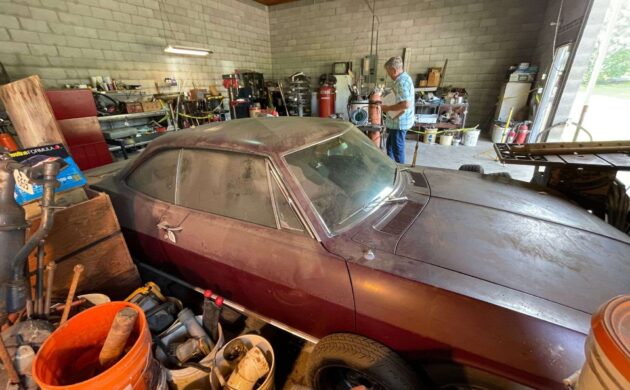
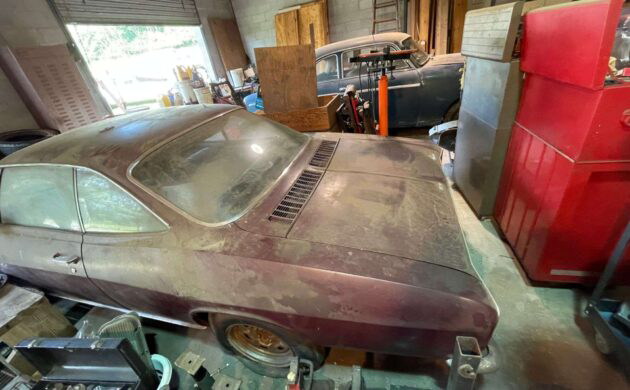
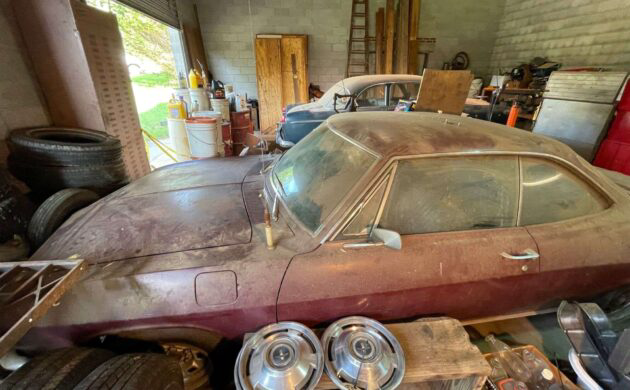
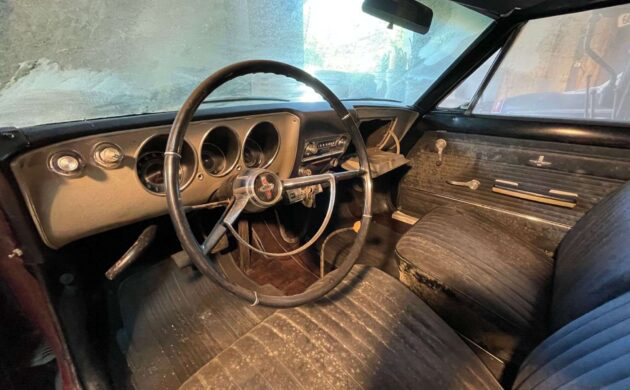
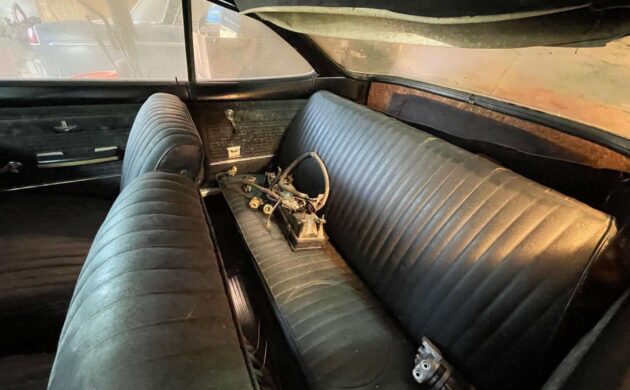
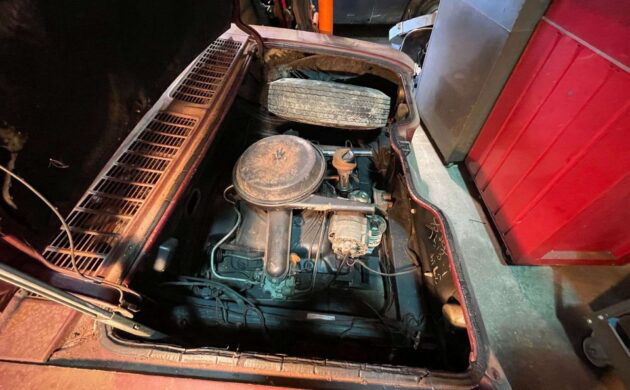




My ’65 was a Monza with spoked wheel covers, telescoping wood wheel, 4 speed with a tach in the dashboard. That makes this one a base model based on the wheel covers and instrument panel. Can’t tell anything about the engines except both had twin carbs but the Monza had a little more horse power. As for year, that’s only a guess as a ’65 or ’66, agreeing it could be a ’67. Not a lot of help here is there.
The 67s went to high back buckets. The 500s had bench seats so it has to be a Monza. It doesn’t have a Corsa instrument panel or badges, so that’s out. The 65s had flat tail lights unique to that year. If you can see the taillights that will answer the 65/66 question.
While credit is given sometimes to Ralph Nader for killing the Corvair, especially the rear suspension, Chevrolet revised the suspension, and built the car for many, many years afterward.
The truth of the matter was that there were bigger factors in play, and the biggest factor road a Falcon chassis.
What really killed the Corviar was the Ford Mustang.
The Mustang range of models, engines, etc and its overall appeal to younger buyers was to a level that the Corvair couldn’t come close to competing, even by adding an interesting turbo option.
The success of the Mustang put Chevrolet light years in sales behind and prompted development of the Camaro, a highly more competitive and appealing vehicle.
Thus, when Camaro was introduced, the Corvair was immediately retired, ending Chevrolet’s questionable attempt to offer a head to head competitor to Volkswagen (multiple models).
But again, Nader’s book didn’t help the Corvairs fortunes, with the newer ones being fairly attractive, but their were bigger factors in play and the of the list killing the Corvair was the immediate domination of the segment by the Ford Mustang starting in 1964.
Congrats if you own a Corvair or a Mustang, both are distinctive and fun rides!
Not true. bench seats and headrest were an option for a few years.
Pretty sure this has a serial number — did they have VINs back then? — somewhere. Find it, type it into a locator, and bingo! you’ll know what year it is. In fact, I’m a little surprised the auctioneers didn’t list it.
A registration or title document will also list the year. If those are missing, there’s a fussy chore ahead for the buyer….
Other than that, I’d go with Bob Hess’s estimate. At least we can be sure it’s not a ’60-’64.
It’s either a 65 or 66 Corvair Monza coupe. The build tag indicating the assembly plant and option codes can be found in the engine compartment on the inside of the rear core support to the right of the license plate. My best guess it’s a 65 Monza trim with either the 95 or 110 engine and either a 3 or a 4-speed manual transmission.
65, the only year that the instrument panel was painted argent.
This. Also, I think I can see the “Corvair” script on the left front corner of the frunk in one photo. That was ’65 only, for ’66 the “Corvair” badge migrated to the front fascia, where it remained through the end of the run.
Alphasud is correct. The ONLY way to know what year this car is would be to find the build tag on the ledge inside the engine compartment just behind the license plate. Nearly every other part of the car can been changed by switching parts, so you can’t know for sure what year it is by looking at the outside or interior.
1965 because there are no seatbelts. They were an option on Corvairs in 1965 and became mandatory in 1966. Also optional in 1965 was a padded dashboard. The paint in the hubcap emblems, side fender emblems, and front emblem were specific to 1965. Over the years the emblems stayed mostly the same but the colors inside of them varied. Also the factory antenna placement on the passenger front (not the wacky CB antenna on the drivers side), optional fold down rear seat, and clear or yellow front turn signal lenses (can’t see them in the pictures).
I truly believe that 95 percent of all Corvairs that have not been crushed are in a garage buried in rubble. It’s like this in every.single.ad!
I think you’re right. There’s been a red /black interior/ black convertible top one in my neighborhood for as long as I can remember. The owner frequently has the garage door open to reveal less and less of the car as the years go by. I’m often tempted to go knock on the door and see what he’d take for if I help him unbury it.
I believe its a ’65. Headrests were not legally mandated until January 1, 1969.
1966..
I had a 65 66 67 and 69. The 69 was the only one with headrests.
No. It’s a 65.
either love em or hate em??they where not for sitting in traffic overheating cause air cooled? I bet a lot got parked because of engine issues overheating and such Remember The Fieros they recall them and then they started putting front radiators in those to water cool the engine maybe they could have done something like that and saved a lot of hardship and the design getting into manufacture and not having the consumers having a lot of problems with it…
my dad had some year of van and I keep thinking it was a Corvair but got it was like 35 years ago that was like 1988 and I was 20 years old and he had this van and I couldn’t remember a Ford made one that was similar but I’m pretty sure it was a Corvair van and it used to belong to a plumbing company and it still had red white and blue on it and the plumbing companies logo painted on it which made it kind of neat kind of nostalgic 60s kind of patina on it but one day we was driving past a bunch of red white and blue garbage cans and I told them that’s what your Van’s going to look like when it ends up in the junkyard…
He heard me razz him a lot about it but it was a pretty good running van and throwing the fishing poles and stuff in the back of it was no problem putting a bench in it and partying in it going out fishing in it it was great for that
Fieros have the radiator in the front, and how do you overheat an air cooled engine? Theres a big engine driven fan blowing on it at all times. Cool story otherwise.
How do you overheat a Corvair? Quite easily in fact. All you have to do is jump the fan belt off of the pulleys and drive the car not paying attention to the generator/fan warning lamp. Belt tension was critical on these engines. Too tight and it would jump. Too loose and it will jump. You might get lucky and stop before seizing the engine only to have a valve seat fall out of the head down the road.
It appears you have a lot to learn about air cooled engines.
Over heating issues didn’t happen while idling, they happened if you pushed it too hard AND you didn’t have your fan belt sorted out- top pulley bearing, straight pulleys, upgraded idler, etc. Unlike Porsche, the Corvair fan centered over the top of the boxster engine, provides even cooling to all the cylinders. There are a lot of upgrades and knowledge bases available if you want to declare war on cooling issues.
I agree with MisterLou. The horizontal fan worked well as did the oil cooler (with fresh seals) to keep the engine cool. My ’65 Corvair without A/C had no overheating issues while driving in Phoenix summers, but it would ping in the desert heat if I pushed it too hard on the highway. I would simply slow down to 10 over the limit.
Back in the day my father and I owned about 8 vairs at various times. I never recall an overheating problem even in Chicago summer traffic jams. As long as the fan belt didn’t snap you were in good shape. You had to keep an eye on the oil level though.
Excellent write-up Jeff. I’m also impressed with the knowledge of Barn Finders, who often know some obscure piece of information about a given model.
If the wheel covers shown are original to the car, it’s a ’65.
My uncle had one exactly like this same color inside and out. I remember one day my grandfather used it to go get some parts for a truck he was fixing. I rode along with him and 2 times the belt jumped off I remembered my grandfather cursing while putting it back on. We never used that car again. I have to admit though that I like the corvairs if only GM would have made them handle better I believe the could have been a great sports car. GLWTA
Handling on the 65 and later cars was terrific. I would challenge anyone to find a better handling car from that era. I owned a 65 and drove several friends’ Corvairs and nothing was better in the corners.
Alpasud: Any water cooled engine will also overheat, quite easily in fact, if it tosses the fan belt, duh! My best friend has had a string of Corvairs over the decades and he has never mentioned any overheating problems. It might be because he’s a competent gearhead.
Although not on the car, the wheel covers shown are ’65.
Water cooled engines have way more issues with overheating. Stuck thermostat, plugged radiator, failed water pumps, broken belts just like Corvair, coolant leaks, incorrect coolant mix.
Corvairs have summer/winter flaps that are needed to be opened/ closed at different times of the year to facilitate engine cooling. There’s also a cover on the oil cooler with writing that tells you specifically how to operate it in hot/ cold weather. Also, if home mechanics removed any of the sheet metal shrouds around the engine then that will overheat the engine in traffic jams on a hot day. The fan belt is not a regular fan belt, the material in it weaves in more directions to be flexible enough to make the 90 turn from the crankshaft to the fan.
I wish it was closer besides this there are multiple other items listed in the auction that I would bid on. There is even a parts car to this along with some engines
In this same auction I noticed Lot 688 was a rusted parts Corvair in the field. There is also a Pontiac Lot 702 in the barn. They do not post very good photos! Like a guessing game, but as I am reading the previous comments, you guys are great detectives!
Regards, Theo
Opps! Sorry Troy! I just read that you saw this as well!
If the wheel covers is one came with car, it’s a 1965.
It has map pockets in the doors, which were only on the ’65 in the Second-Series.
I had a ’65 Monza with a rebuilt 4-carb engine~ a gem~ and a four-speed: fantastic car! Same color.
Beautiful and so fun! Open the windows of the hardtop, vent windows~ so much better than today’s cars!
Put some money into it, but it dropped a valve… : (
Solved it for me Robert! Forgot about the map pockets I had on my ’65 Monza.
My 1965 did not have map pockets.
I am willing to bet one of you are right.
ROGER, BOB N TN..I had a 64 took it straight from the dealer to PENN and had it buillt by ‘YOU KNO” to 300 horse won the F modified production title in 1965. BEAT ‘DON” in his AA Corvette ( I was given the entire tree and 10 seconds to come out of the hole)) at National trails /Columbus , Beat him by the thickness of my bumper. JEG my buddy was my tuner.
Based on Jeff’s article,attached photos, &
my experiences in my youth with two 1965 Corvairs both a 110 hp. Monza and a Corsa 140 convertible I’d say both the interior & hubcaps are both indicative of a
Madera Maroon 110 hp. Monza.
As far as the controversy of both the overheating and the belt, and pulley go …
been there , done that !
Either the harmonic balancer pulley was
intentionally designed from two pieces of steel with a layer of rubber sandwiched
in between to self destruct and if overheating occurred or it was merely a poor engineering or design faux paux .
After replacing that two piece pulley twice
from overheating and coming apart the
main part being still being in place and the
Outer race of the pulley and belt taking a
hike and stopping the Corvair I decided to
buy a solid one piece billet pulley machined from a solid piece of steel from the Oregon Corvair Underground and that
cured that problem.
Oh the memories tainted by time ; flat on
ones back on a creeper with the ‘Vair on
jack-stands changing rubber seals both on the push rod tubes and in the heads
to stop oil drips, adjusting valves, yada, yada, yada.
Cudo’s to Jeff Bennett on this great Corvair article , and also to Barn Find’s
Own “ CAT’S MEOW “ Michelle Rand in
her prior great Corvair article
Mike A.
( aka ..” Mr. A. “
My ’65 Monza was Madera Maroon with the 110 hp engine. TomP, was your car the base model?
My 1965 was a Monza 110. Now that I think about it, maybe it did have map pockets.
I have had several Corvairs and still have a 64 Monza rag top. But with this 65 Corvair being average, I’ll bet many of us are tired of fixing and replacing and fixing and replacing forever. There is a full can of worms to deal with from one end to the other on this “moldy barn find”. Move on as there is nothing special here to see folks.
Don’t hold this against me, but the 65-69 Corvair 110 hp engines make a great transplant into several models of homebuilt aircraft too.
Helped a friend put a 110 into a ’56 VW panel van. Used it for support for desert motorcycle trips. Would climb mountains that we had to walk the bikes up under power to get them to the top. Fun vehicle.
I had a ’64. There was a fix for the belt problem. Once I did that it was a great little car. This one is a ’65 w/110hp twin carb. If it has the 4 spd could be a cool car
Or the little door over the trunk lock. If it’s red, it’s a 65. If it’s blue, it’s 66-69.
67 were not high back buckets. They were the astro bucket design but did not have a standard headrest. 68 & 69 had headrests,
65 Monza and Corsa had map pockets in the door panels. The 500 did not.
On 65 models, some of the bolts holding the top engine shroud to the cylinder head were 1/4 inch course thread and two on each side were 3/8 course thread. 66-69, they were all 3/8 course thread.
No Monza had a factory tach. That was on the Corsa only. Corsa was 65 and 66 only.
This one has the base of a 140 hp air cleaner, so ignore that.
The shifter appears to be chrome. That’s a 4 speed.
Seats have been redone in a non-oe covering.
It looks like a 65 to me. As far as the belt coming off problem, it was because everyone went down to their local auto store and bought the cheapest belt they could find. I owned 3 different Corvairs and always bought them from the dealer or Clarks Corvair. I never had any of them come off.
Don’t know anything about what year it is, but I parked my 1963 Monza in 1972 while driving with my head out the window because of the failed seals for the heating system in the engine compartment. Was too old and too expensive to have the work done, so I parked it…. and it may be in Barn Finds someday if I ever decide to sell it! Might be part of the reason there didn’t seem to be as many on the road as noted. My understanding was that it was a common problem, but don’t know for sure.
Based on the apparent thickness of the wheel well trim, it’s a 65 Monza. It has a Corsa steering wheel, but the dash is not Corsa.